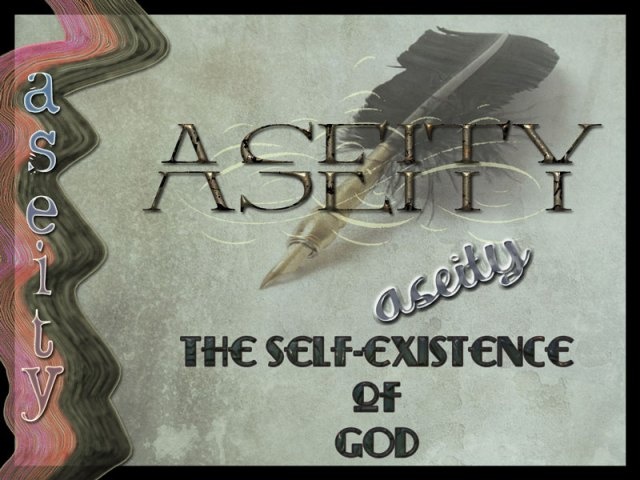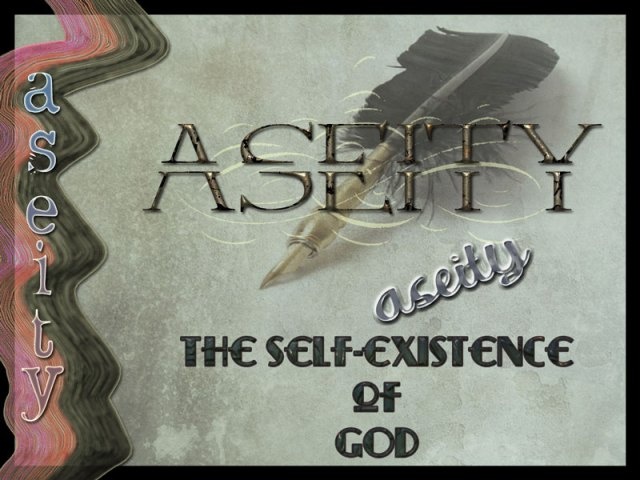One day a group of scientists got together and decided that man had come a long way and no longer needed God. So they picked up one scientist to go and tell God that he was no longer needed. The scientist walked up to God and said, “God, we’ve decided that we no longer need you. We’re to the point that we can clone people and do many miraculous things through science. So, why don’t you go and get lost?” God listening patiently said after he was finished speaking, “Very well, how about this? Let’s say that we have a man-making contest?” “Okay, fantastic!” replied the scientist. “But,” God said, “we have to do it just as I did back at the very beginning.” “Sure,” the scientist replied. The scientist bent down and grabbed some dirt and chemicals. God looked at him and said, “No, no, no. You go and create your own dirt, air, water, chemicals, and universe.” The scientist conceded their defeat.[1]
In Exodus 3:13-14, we read God’s response to Moses. Moses was a Hebrew growing up in Egypt. Egypt had a multiplicity of gods. Here, God had asked Moses to lead the Hebrew people out of bondage. It was natural for Moses to ask, “Who should I tell them is sending me?” God gave his personal name, “Yahweh.” The name Yahweh is a complicated name which means “I AM WHAT I AM.” In other words, it means the “self-existent One.” Theologically, this attribute of God is known as “aseity.” Aseity comes from the Latin term “aseite” or “a se” which means “to exist from oneself.” What does this mean? Due to the complexity of today’s topic and to simplify the issue, many of our points today were borrowed from the section of Norman Geisler’s book Systematic Theology dealing with aseity.[2]
God’s aseity demonstrates God’s ACTUALITY (Exodus 3:13-14).
Looking back at today’s primary text, Moses said to God, “’If I come to the people of Israel and say to them, ‘The God of your fathers has sent me to you,’ and they ask me, ‘What is his name?’ what shall I say to them?’ God said to Moses, ‘I AM WHO I AM.’ And he said, ‘Say this to the people of Israel, ‘I AM has sent me to you’” (Exodus 3:13-14).[3] Here, we find the name “Yahweh aser Yahweh.” The name Yahweh is defined by Strong’s Dictionary as “to exist, be in existence.”[4] In other words, the name of God demonstrates that God is self-existent. Theologically, this is called God’s “actuality” which means that God is independent and self-existing.
God’s aseity demonstrates God’s UNCAUSALITY (Psalm 90:2).
Psalm 90 is a psalm written by Moses. Moses writes, “Before the mountains were brought forth, or ever you had formed the earth and the world, from everlasting to everlasting you are God. You return man to dust and say, ‘Return, O children of man!’ For a thousand years in your sight are but yesterday when it is past or as a watch in the night” (Psalm 90:2-4). In other words, Moses, in his psalm along with Genesis 1:1, teaches that God is the uncaused cause of all things. God had no cause. He is eternal, timeless, in nature.
God’s aseity demonstrates God’s NECESSITY (John 1:3; Romans 11:36).
John writes “All things were made through him, and without him was not any thing made that was made” (John 1:3). Paul writes, “For from him and through him and to him are all things. To him be the glory forever. Amen” (Romans 11:36). In other words, they tell us that God’s existence is necessary because of the existence of anything.
God’s aseity demonstrates God’s Immutability (Malachi 3:6).
The prophet Malachi, speaking for God, writes, “For I the LORD do not change” (Malachi 3:6). When we speak about God’s immutability, we mean that God is unchangeable.
God’s aseity demonstrates God’s SUSTAINABILITY (Colossians 1:17).
Paul writes in Colossians 1:17 that God is “before all things, and in him all things hold together” (Colossians 1:17). In other words, God’s self-sustaining existence demonstrates the need for God to hold and sustain all of creation together.
So, how does God’s aseity affect you?
- God does not need us, we need him!
So often we feel that God needs us in some form or fashion. God could have existed just fine without creating us. Our existence was never necessary. God’s existence is. Thus, we should realize that God should be the center of our worship and adoration. Worship is God-centered not man-centered.
- The universe does not revolve around you, it revolves around God.
Living in a time of self-entitlement, this reality may serve as a blow to the ego as we post on social media to see how many “likes” we can obtain. Often people seek to brag about their accomplishments to obtain approval from another. However, God’s aseity reminds us that the world and the universe really does not revolve around us. It revolves around God.
- If we refuse to be used by God, God will use someone else.
A person should be humbled to realize that their existence is not necessary. Yet, the believer should be further humbled to realize that it is a great privilege to serve Christ. If the believer refuses to serve God, God will simply use someone else. God’s mission to extend salvation to humanity is not stopped by one person’s obstinacy.
- God speaks his love to us by deciding to create us.
The psalmist writes that “the heavens declare the glory of God, and the sky above proclaims his handiwork” (Psalm 19:1). Yet, God’s aseity also demonstrates God’s love for all of humanity. God did not have to create any of us. The fact that we can experience life is a demonstration of God’s great love. God gave us life. Life is a great blessing!
- It is unspeakable to think that God would also desire to save us!
If you are humbled by the fact that God demonstrated grace to create you, it is mind-boggling to think that God went out of his way to save you! God would have been perfectly justified in condemning all of humanity to an eternal hell. However, God didn’t. God chose, rather, to save those who would receive his grace. God’s aseity should humble us and cause us to desire to worship God with every morsel of our being.
© March 9, 2016. Brian Chilton.
Sources Cited
Geisler, Norman. Systematic Theology: In One Volume. Minneapolis: Bethany House, 2011.
Hodgin, Michael E. 1002 Humorous Illustrations for Public Speaking. Grand Rapids: Zondervan, 2004.
Strong, James. Enhanced Strong’s Lexicon. Woodside Bible Fellowship, 1995.
Notes
[1] Michael E. Hodgin, 1002 Humorous Illustrations for Public Speaking (Grand Rapids: Zondervan, 2004), 280.
[2] Norman Geisler, Systematic Theology: In One Volume (Minneapolis: Bethany House, 2011), 436.
[3] Unless otherwise noted, all quoted Scripture comes from the English Standard Version (Wheaton: Crossway, 2001).
[4] James Strong, Enhanced Strong’s Lexicon (Woodside Bible Fellowship, 1995).







[…] One day a group of scientists got together and decided that man had come a long way and no longer needed God. So they picked up one scientist to go and tell God that he was no longer needed. The scientist walked up to God and said, “God, we’ve decided that we no longer need you. We’re to the point that we can clone people and do many miraculous things through science. So, why don’t you go and get lost?” God listening patiently said after he was finished speaking, “Very well, how about this? Let’s say that we have a man-making contest?” “Okay, fantastic!” replied the scientist. “But,” God said, “we have to do it just as I did back at the very beginning.” “Sure,” the scientist replied. The scientist bent down and grabbed some dirt and chemicals. God looked at him and said, “No, no, no. You go and create your own dirt, air, water, chemicals, and universe.” The scientist conceded their defeat.[1] […]